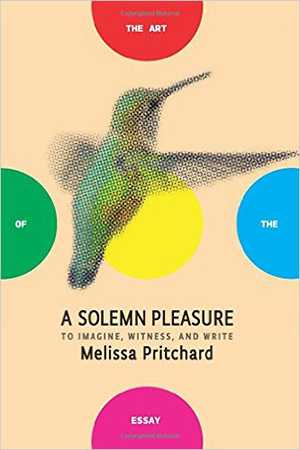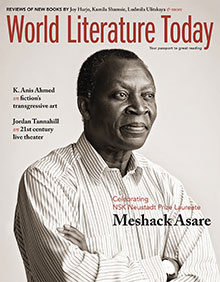A Solemn Pleasure: To Imagine, Witness, and Write by Melissa Pritchard
 New York. Bellevue Literary Press. 2015. 205 pages.
New York. Bellevue Literary Press. 2015. 205 pages.
In her new book, A Solemn Pleasure, Melissa Pritchard notes that “The ancient Latin root for pilgrim is per agrum, one who walks beyond known boundaries,” succinctly comparing a writer to a wandering pilgrim—becoming a witness to her time and a recorder of her age. The literature of testimony, according to the author, should be the writing about pain and the healing of that pain, because the profession of writing is “a profound vocation of healing.”
To see is to understand. In this book, there are stories of a female soldier who dies young in Afghanistan, accounts of the author’s traveling with Ethiopian tribes, and memories of a Sudanese child slave—social injustices meet the author wherever she travels in the world. In Africa, she strives to advocate for the preservation of traditional ethics and values of the ancient land. But the situation turns out to be terminally unstable, and the peoples of this once-remote region are under imminent threat of extinction: international investment continues to flow in, the grazing lands and forests are confiscated for commercial cotton and sugarcane plantations, and a series of massive hydroelectric dams are set up, which endanger these tribes and their way of life. “I am somebody. Please see. Please help!” The author is obliged to make a record of their traditions before they are lost forever.
Thus literature today is not an art of leisure but an urgent act, and it must be in a state of constant obligation. Pritchard reminds us of the environmental crises and social problems throughout the book while stressing the transcendental power of writing, which can help the writer to be the architect of a vast, collective soul. In this sense, Pritchard once again validates the assertion that all true art is moral, as it instructs by seeking to improve life.
Even though the author proclaims that “Why write?” is the theme of the book, it is obvious that her real mission is to inform what to write. From this perspective, some of the pieces in this fifteen-essay collection, such as “Decomposing Articles of Faith” and “Doxology,” might have been reserved for a later collection as they are not very consistent with the topos.
Yang Jing
Nanjing Normal University





































